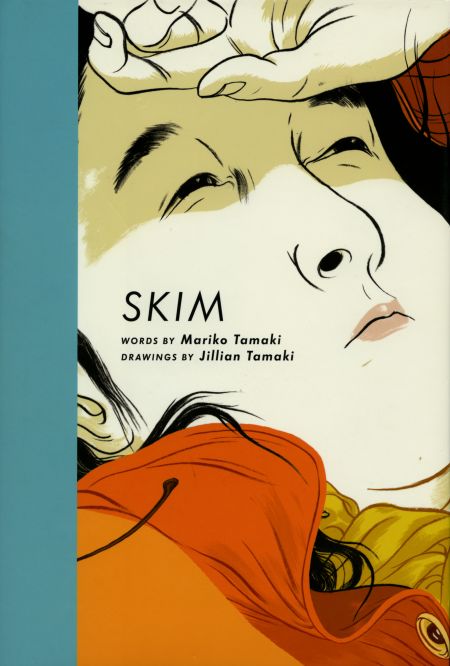Comics /
Comics News
Who Should Help the Governor General Awards Understand Comic Books?
By Hervé St-Louis
November 14, 2008 - 18:34
In the new controversy regarding the apparent snub of artist Jillian Tamaki as a nominated creator, along with author Mariko Tamaki for the graphic novel
Skim, the main question asked by many pundits is whether or not the awards failed to understand how sequential art is created?
On October 21, 2008, the nomination for the 2008 Governor General Awards were announced. The Governor General Awards are probably of the highest rated awards in Canada; as they are awarded by the country’s head of state, Her Excellency the Right Honourable Michaëlle Jean. The Governor General is also the vice Queen of Canada, the representative of the Elisabeth II, Queen of Canada.
The graphic novel
Skim was nominated in the Children’s Literature — Text category. There is another category for Children’s Literature – Illustration, which did not nominate Tamaki as an illustrator. In fact, none of the children’s books in either the French or the English children’s book awards for texts and illustrations received nominations for either category in 2008.
The Governor General Awards were never designed to cover comic books. In fact, the addition of
Skim to the children’s awards is a breakthrough in itself. As of this writing, the committee behind the awards has refused to adjust the nomination saying it was too late. It’s hard to understand what is so complicated in adjusting a nomination, unless they have to resend all the invitations and change a couple of booklets.
Although a petition by several Canadian comic book industry participants was sent asking for a correction in the nomination, it produced no results. This episode shows the
weakness of the Canadian comic book industry, which
The Comic Book Bin covered in recent articles.
First, there is a pressing need of the Canadian comic book industry to organize itself into an organization, crossing the language barrier of Canada to better represent the interests of all participants, be they artists, retailers, consumers, or publishers in Canada. Such lobby groups exists for film, video games, theatre, book publishing and musicians. Their interests are always heard by authorities and other groups because they are organized and present a definite set of policy recommendations, critiques, and comments on matters that concern them.
Second, the jury recruited by the Governor General Awards was responsible for the omission of Tamaki from the nomination. Had the Awards’ handlers adjusted the nomination process according to the wish of the Canadian comic book industry pundits, they would have to bear the shame. That wasn't going to happen. The nomination process of the Governor General Awards and that of several awards in Canada has always been dubious with industry insiders invited to judge their peers.
Third, part of the nomination with Tamaki has to do with her book publishers, Harper Collins, which was responsible for submitting the book to the awards in the first place. If there are any criticisms, they should be sent to the publisher.
Fourth, the main goal of the comic book industry, for the upcoming years, is to educate the public and cultural and political elites about sequential arts. Just last week, in Gian Ghomeshi’s
Q, a well regarded radio show about arts and culture in Canada, guests Dave Gibbons, Ghomeshi and The Beguiling’s owner kept referring to
The Watchmen as a graphic novel instead of a comic book. A comic book and a graphic novel are not the same thing.
Skim is a graphic novel, but
The Watchmen is a comic book series. Ghomeshi and Gibbons (who is more than happy to parade around the world preaching about
Watchmen – no matter how it is referred to - because of its obvious benefits) can be excused for such dubious wording, but not the owner of The Beguiling. It is this inferiority complex, regarding the comic book industry which is picked up by non-industry participants and that helps to proliferate misunderstandings about what comic books and sequential arts are.
Fifth, education must start with proper usage of comic book-related lexicons and an industry that speaks with a united voice. Then a continuous campaign to educate the public and elites about what comic books can do and how widely they are read and part of Canada’s fabric has to be communicated clearly. But to be able to communicate such a message, the Canadian comic book industry must first clean its own murky background. For example, the language divide must end. Participants from English and French-speaking Canada must meet and end discrimination, such as that found in some awards such as
The Doug Wrights Awards. They must end the literal ignorance and snobbery of both sides of the solitudes. French speakers must start looking at what is happening in English Canada and stop thinking that their culture is stronger and therefore does not need to cooperate with the emerging English culture in comic books.
When the comic book industry will speak as one voice with one consistent message, be it in French or English, then other cultural and political elites will take this industry seriously. For example, the French-speaking comic book industry should be as concerned about the Tamaki affair as its English counterpart. The English-speaking Canadian industry should have made overtures to invite their French equivalent to sign that petition and fight with them. None of that happened. No wonder Tamaki continues to be snubbed. She is not represented by a unified front.
Last Updated: March 3, 2025 - 20:40
